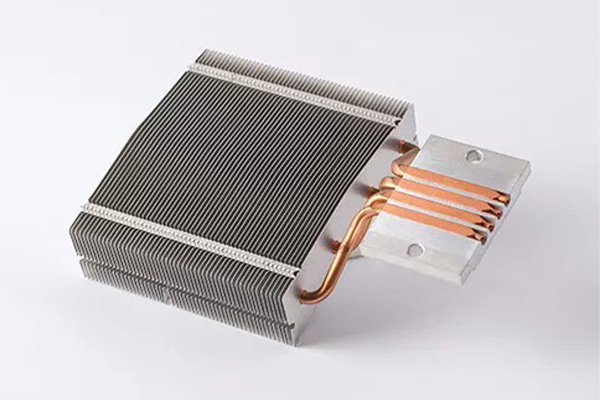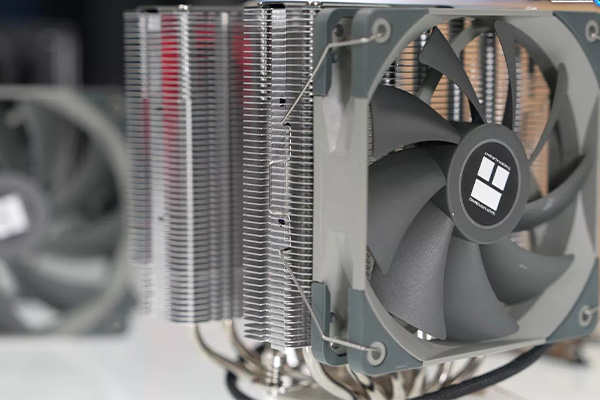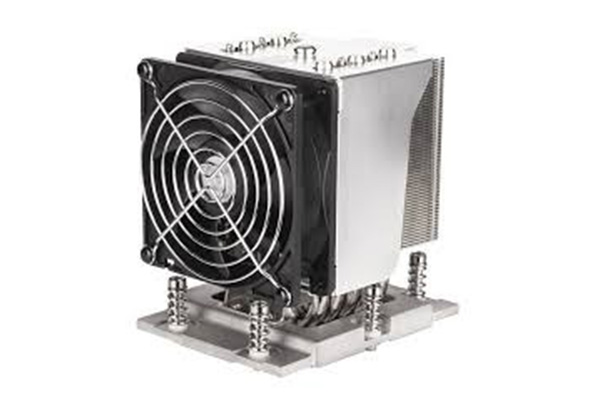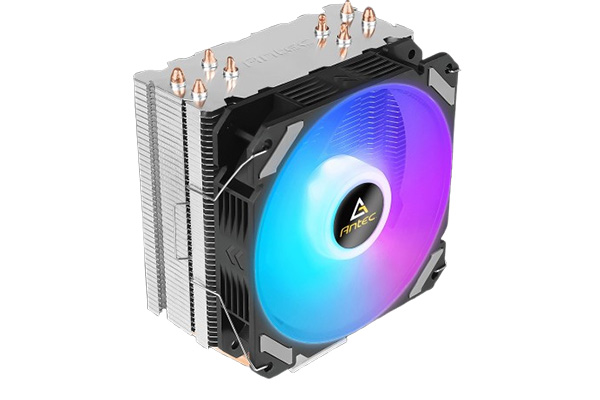Introducción
When it comes to building or upgrading your PC, choosing the right CPU cooler is crucial. Not only does it ensure that your system operates efficiently, but it also helps prevent your CPU from overheating, which can lead to performance issues and even hardware damage. In this guide, we’ll explore the best CPU coolers for AMD Ryzen and Intel Core CPUs in 2025, providing you with the information you need to make an informed decision. Ready to dive in? Let’s get started!

1. What Are CPU Coolers and Why Are They Important?
CPU coolers are essential components in any computer setup. But what exactly do they do? Simply put, CPU coolers are designed to dissipate the heat produced by the CPU during operation. Without adequate cooling, your CPU will overheat, causing throttling, crashes, or even permanent damage.
How Do CPU Coolers Work?
To explain further, CPU coolers typically consist of two main types: air coolers and liquid coolers. Air coolers rely on fans and heat sinks to dissipate heat, while liquid coolers circulate a coolant through pipes and radiators to remove heat more efficiently. Both types are effective, but the choice between the two largely depends on your system’s needs.
Now, you might be wondering—why does this matter? The efficiency of your CPU cooler directly impacts your computer’s performance. A cooler running CPU will perform better and have a longer lifespan, while a hotter CPU will underperform, potentially leading to system crashes.
Factors to Consider
When selecting a CPU cooler, you’ll need to consider several factors:
- Size: Does it fit in your case?
- Compatibility: Will it work with your motherboard and CPU socket?
- Noise levels: Some coolers can be noisy, which can be annoying.
- Cooling performance: Does it handle the heat generated by your CPU, especially if you’re overclocking?
2. What Should You Consider When Choosing a CPU Cooler?
Elegir lo correcto CPU cooler can feel overwhelming, but don’t worry—it doesn’t have to be complicated. To help you make the best choice, we’ll break down the essential factors to keep in mind.
Compatibility with Your System
One of the first things to check is compatibility. You’ll need to ensure that your cooler works with both your CPU socket and your motherboard. Most coolers are designed to support a range of sockets, but it’s always a good idea to double-check the specs before purchasing. For example, the AMD Ryzen y Intel Core processors use different socket types, so you’ll need a cooler that supports the specific socket of your CPU.
Performance vs. Size
You’ll also need to balance cooling performance with tamaño. Larger coolers typically offer better performance, especially when it comes to overclocking, but they might not fit in all cases. If you have a small form factor case, you may have to opt for a more compact cooler, even if it means sacrificing a bit of performance.
Noise Levels
Another factor to consider is the noise level of your cooler. While liquid coolers tend to be quieter than air coolers, the trade-off is often in the form of more complex installation. On the other hand, air coolers are generally easier to install, but they can get noisy, especially if the fan speeds are too high.
Here’s the kicker: cooling performance matters the most for those who plan to overclock their CPU, but even if you aren’t overclocking, good cooling will help prevent thermal throttling and ensure your system runs smoothly.
3. ¿Cuáles son los diferentes tipos de disipadores de CPU?
There are primarily three types of CPU coolers to consider for your system: air coolers, liquid coolers, y hybrid coolers. Let’s break each of them down to help you understand which might be the best fit for your needs.
Enfriadores de aire
Air coolers are the most common type of CPU cooler, and they are the go-to choice for most users. These coolers consist of a heat sink y fans that dissipate heat away from the CPU. The heat sink absorbs the heat, while the fan blows the hot air away. While air coolers are generally less expensive and easier to install, they can be bulkier and louder than liquid coolers.
¿Cuál es la verdadera historia? Air coolers are effective at keeping the CPU temperature within safe limits, but they may struggle with heavy overclocking. If you’re looking for something more advanced, a liquid cooler might be a better option.
Refrigeradores líquidos
Liquid coolers use a closed-loop system where coolant circulates through tubes, carrying heat away from the CPU and into a radiator where it’s dissipated. This type of cooler is typically more effective than air coolers, especially for overclocking. Liquid coolers also tend to be quieter, but they are more expensive and require more complex installation.
Hybrid Coolers
Hybrid coolers combine the best of both worlds by using both air and liquid cooling technologies. These coolers feature a pump and radiator for liquid cooling but use fans for additional air circulation. Hybrid coolers are ideal for users who want maximum cooling without sacrificing too much in size or noise levels.

4. How Do Air Coolers Work?
Air coolers are straightforward and easy to understand. Essentially, they rely on fans and heat sinks to keep your CPU cool. The heat sink is made of metal, typically aluminum or copper, and absorbs heat from the CPU. The fan then blows air across the heat sink, expelling the hot air from your system.
Pros of Air Coolers
- Cost-effective: Air coolers are generally cheaper than liquid coolers.
- Easy installation: Unlike liquid coolers, air coolers are relatively easy to install.
- Durabilidad: With fewer moving parts, air coolers tend to have a longer lifespan.
Pero aquí está el truco.: While air coolers are a great option for many users, they can become quite bulky. Larger coolers may struggle to fit inside smaller cases, so be sure to check compatibility before purchasing.
5. How Do Liquid Coolers Work?
Liquid coolers are designed to handle higher levels of heat and provide superior cooling. These coolers feature a closed-loop system, where coolant circulates through pipes, transferring heat away from the CPU to a radiator. The radiator then dissipates the heat, keeping your CPU temperature in check.
Pros of Liquid Coolers
- Better cooling performance: Liquid coolers are more efficient at cooling, especially for overclocking.
- Quieter operation: Because liquid coolers use larger radiators and fewer fans, they tend to be quieter.
- Compact design: Liquid coolers are often smaller than air coolers, making them ideal for tight spaces.
This is where it gets interesting: Liquid coolers are the go-to choice for enthusiasts y overclockers who need maximum performance. They’re also a great choice if you want a quieter system.
6. How Do Hybrid Coolers Differ from Air and Liquid Coolers?
Hybrid coolers combine both air y liquid cooling systems, giving users the best of both worlds. These coolers typically use a liquid pump and radiator to cool the CPU, while also including fans for additional air circulation.
Pros of Hybrid Coolers
- Maximum cooling: Hybrid coolers provide superior cooling performance.
- Quiet operation: With the combination of liquid cooling and efficient fans, hybrid coolers can be quieter than air coolers.
- Compact design: Hybrid coolers tend to be more compact than traditional air coolers, making them ideal for smaller cases.
7. What Are the Best CPU Coolers for AMD Ryzen in 2025?
When it comes to AMD Ryzen processors, you’ll need a cooler that can handle the power and performance these CPUs offer. There are several top coolers on the market in 2025 that are optimized for AMD Ryzen.
Best Air Coolers for AMD Ryzen
- Cooler Master Hyper 212: A budget-friendly option for those looking for solid cooling.
- Noctua NH-D15: A premium air cooler with excellent performance.
Best Liquid Coolers for AMD Ryzen
- Corsair iCUE H150i Elite: One of the best liquid coolers for AMD Ryzen processors, offering high performance and low noise levels.
- NZXT Kraken X73: A reliable and efficient liquid cooler designed for AMD Ryzen CPUs.
Best Hybrid Coolers for AMD Ryzen
- Corsair H115i Pro: Combines liquid cooling with additional air cooling for optimal performance.
- Thermaltake Floe Riing: Offers great cooling performance and a sleek design for AMD Ryzen systems.
8. What Are the Best CPU Coolers for Intel Core in 2025?
Intel Core processors also require powerful coolers to handle the heat generated during heavy workloads. Fortunately, there are several excellent coolers available in 2025 that work great with Intel Core CPUs.
Best Air Coolers for Intel Core
- Cooler Master Hyper 212: Affordable and effective for standard workloads.
- Noctua NH-U12S: A compact air cooler that provides excellent performance for Intel CPUs.
Best Liquid Coolers for Intel Core
- Corsair iCUE H150i Elite: Offers top-tier performance and cooling efficiency.
- NZXT Kraken Z73: A liquid cooler that excels in cooling Intel Core CPUs while maintaining a low noise profile.
Best Hybrid Coolers for Intel Core
- Corsair H115i Pro: Perfect for Intel systems requiring top performance under load.
- Thermaltake Floe Riing: Another excellent hybrid cooler, offering great performance and aesthetics.

9. How Do CPU Coolers Affect Gaming Performance?
When you’re gaming, every second counts. CPU coolers play a vital role in ensuring your system performs at its best during intense gaming sessions. If your cooler isn’t up to the task, your CPU might overheat, causing lag, crashes, or throttling.
Impact of Cooling on CPU Performance
A good CPU cooler ensures that your processor stays within optimal temperature ranges. Overclocking can generate a lot of heat, but with the right cooler, your CPU can maintain a higher clock speed for longer periods.
¿Listo para la buena parte? A high-quality CPU cooler can make all the difference between smooth gameplay and frustrating lag during high-performance gaming. If you’re into gaming, an efficient cooler is a must-have.
10. How Do CPU Coolers Affect CPU Longevity?
Overheating is one of the primary causes of CPU failure, so a good cooler can significantly extend the lifespan of your processor. When temperatures remain under control, your CPU will perform better and last longer.
Importance of Consistent Cooling
When your CPU is consistently cooled, it doesn’t experience thermal throttling, which can slow down performance. High temperatures over time can cause permanent damage, reducing the lifespan of your hardware.
What’s the catch? Consistent cooling is essential for protecting your CPU from long-term damage. Investing in a quality CPU cooler now could save you from costly repairs down the line.
11. What Are the Benefits of Overclocking with a Better CPU Cooler?
Overclocking can push your CPU to perform beyond its rated specifications, but this generates more heat. Without a proper cooling system, overclocking can lead to instability and even damage your CPU. That’s where a good cooler comes in.
Cooling and Overclocking Potential
The right cooler can unlock your CPU’s potential for higher speeds, providing better performance in games and demanding applications. Liquid coolers and hybrid coolers are particularly effective for overclocking.
This is where it gets interesting: With a quality cooler, overclocking becomes much safer and more rewarding, enabling higher frame rates and better performance in resource-intensive games.
12. How Do I Install a CPU Cooler?
Installing a CPU cooler isn’t too complicated, but it does require some attention to detail. Here’s a step-by-step guide to help you through the installation process.
Installing an Air Cooler
- Prepare the CPU: Clean the surface of the CPU and apply thermal paste.
- Attach the Heat Sink: Position the heat sink over the CPU and secure it in place.
- Install the Fan: Connect the fan to the heat sink and motherboard.
Installing a Liquid Cooler
- Install the Radiator: Position the radiator in your case where it will get optimal airflow.
- Mount the Pump: Attach the pump to the CPU and connect the tubes.
- Connect the Cooling System: Plug the fans into the appropriate headers on the motherboard.
13. What Are Common Problems with CPU Coolers?
Even the best CPU coolers can experience issues. Here are some common problems users face:
Common Issues
- Inefficient Cooling: If your cooler isn’t performing well, it could be due to poor contact with the CPU or a clogged fan.
- Noisy Operation: Some coolers can become noisy over time, especially if dust accumulates.
- Compatibility Issues: Make sure the cooler fits your case and supports your CPU socket.
Pero aquí está el truco.: Maintaining your cooler and ensuring proper installation can help you avoid many of these issues.
14. How Do I Maintain My CPU Cooler?
Proper maintenance of your CPU cooler will keep it running smoothly for years to come. Here’s how to keep things in top shape.
Limpieza regular
Over time, dust can accumulate in your cooler, reducing its efficiency. Use compressed air to clean out the dust from the fan and heat sink.
Replacing Thermal Paste
Thermal paste helps transfer heat from your CPU to the cooler. After a few years, it may dry out, so it’s important to replace it to maintain efficient cooling.
¿Cuál es la verdadera historia? A little maintenance can go a long way in keeping your cooler running like new.
15. What Are the Top Brands for CPU Coolers in 2025?
In 2025, several brands stand out for their high-quality and reliable CPU coolers. Here are the top brands to consider.
Top Brands
- Cooler Master: Known for its budget-friendly and efficient coolers.
- Noctua: Offers premium coolers that deliver exceptional performance.
- Corsair: Renowned for its liquid coolers and easy installation.
Here’s the kicker: The right brand can ensure that your cooler lasts for years, providing consistent cooling performance.

Sección de preguntas frecuentes
Pregunta 1: ¿Qué es un disipador de CPU?
A CPU cooler is a device that dissipates heat from your CPU to maintain optimal temperature and prevent overheating.
Pregunta 2: How does a liquid cooler work?
Liquid coolers circulate coolant through tubes to absorb heat from the CPU and transfer it to a radiator for cooling.
Pregunta 3: How do I know if my CPU cooler is working properly?
Check the temperature of your CPU, listen for fan noise, and make sure the system is running smoothly without throttling.
Pregunta 4: Can I use the same cooler for both AMD Ryzen and Intel Core CPUs?
Not always. Some coolers are designed for specific CPU sockets, so you need to check compatibility.
Pregunta 5: How often should I replace my CPU cooler?
It’s recommended to replace your cooler every 3–5 years, or sooner if you notice performance drops or increased temperatures.

